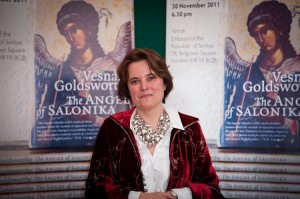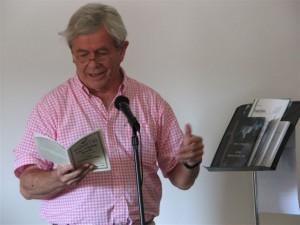Vesna Goldsworthy
 Vesna Goldsworthy (1961, Belgrade) lives in London and writes poetry in English, her third language, as well as her native Serbian, in which her poetry is much-anthologized. Aged twenty-three, she read her poems at a football stadium to an audience of thirty thousand people. She moved to Britain soon afterwards and did not write a line of poetry for over twenty years. Her Crashaw Prize winning debut poetry collection in English, The Angel of Salonika (Salt, 2011) was one of the Times Best Poetry Books of the Year.
Vesna Goldsworthy (1961, Belgrade) lives in London and writes poetry in English, her third language, as well as her native Serbian, in which her poetry is much-anthologized. Aged twenty-three, she read her poems at a football stadium to an audience of thirty thousand people. She moved to Britain soon afterwards and did not write a line of poetry for over twenty years. Her Crashaw Prize winning debut poetry collection in English, The Angel of Salonika (Salt, 2011) was one of the Times Best Poetry Books of the Year.
Yalta
Everything in the world is really beautiful, everything but our thoughts and actions…
A.P. Chekhov, “The Lady with the Dog” (1899)
After they made love that first time
She still felt distant enough to use the formal you
In the first question she posed.
He contemplated the heavy Japanese scent
He helped her choose the day before.
Something less overwhelming, with more zest,
Would have suited Yalta better, now he knew,
Than the red spider lily.
That flower grows, so legend says,
Along the path on which you meet
Someone you will never see again.
He was still naked when he got out of bed
And sat down at the table to cut a slice of watermelon.
His testicles rested on the chair.
The lacquered wood felt pleasantly cool.
They stayed like that for thirty minutes at least.
Her little Pomeranian dog was there too
Watching his mistress, then him,
As he chewed the red flesh in silence.
The two pairs of eyes
Seemed similarly moist in candlelight.
If she were not naked – or not shy –
If she could only fling the window open,
Would they still hear the crashing
Of the waves
In the darkness below,
Like earlier that evening,
A century ago?
Sanssouci
I am old enough to remember
The appearance of Akhmatova’s Requiem,
The ambiguities of Brecht, Brodsky in his prime,
The Wall before it fell, the sound of planes
Taking off and landing. Nearby, another country.
On our long ride to Potsdam
We carved a crescent, a Cyrillic S,
In the first snow of the season,
As we wound our way across
The white spaces on the map,
Along the streets which echoed in Russian
And smelled of coal, cabbage, and wool.
It took years to reassemble
The memory of winter love-making
Undone on the parturition table,
In the encounter of metal and flesh.
The nurse returned with a pack of wadding.
It will cease in a day or two, she said
As though you were, already, absent. Do rest,
Drink some Georgian red, forget.
She straightened the shawl on my shoulders.
Under her uniform, the smell of sweat
Was just like mother’s, the night she was taken.
Our bicycles remained padlocked at the gate.
The brushstrokes of white powder
Emphasised the elegance of bars and chains,
A trail of lines in virgin snow,
To but not from, never returning;
So much blood and nothing
Conceived from so much love.
Of all that betrays us, the gentlest is memory.
Leaving the Party
We walk in silence bearing westwards
Along the towpath, against the current.
The Thames slithers and shimmers
On its slow way to surrender
Exhausted and spread-eagled on the sands of Essex.
Bicycle lights approach and frame us
In milky stills of gelatine silver.
Runners pound by in sweat and lycra,
Their footfall like strange amphibians’ heartbeat,
Mosquito buzz of music rises from their ears.
They give a wide berth to the couple of elderly clowns
In dinner jacket and sequins, carefully treading
With patent leather shoes unsuited to water’s edge.
At one point this evening we seemed unbearably close.
I raised my right hand to touch your temple.
Your hair, your fine hair, your fine white hair
Moved towards my fingers in static electricity.
There again was that question I was about to pose.
Then something behind your unquestionable goodness
Suddenly scared me, like ormolu and woodworm.
The cup of my palm still carries that faint fragrance,
The smoothness of black silk where the hand fell in defeat,
The soft woollen cloth, the white cotton underneath,
All those conspiracies of loom and thread
Expensively constructed to shield and to protect
Your skin, your warm skin, in all its unfamiliar creases.
Mine always feels porous, a layer to be shed,
Though I forever shiver — needing a cover, a shawl, a shelter —
Like some short-lived species of insect, a devil’s darning needle.
The darkness grows. The heat’s abating. I’ll hold myself together.
